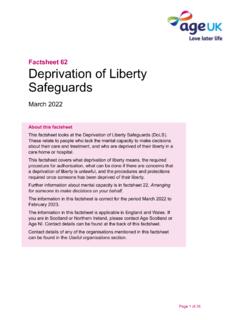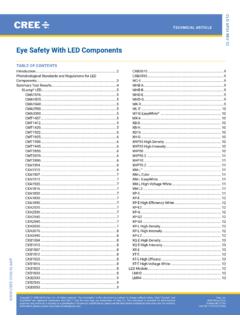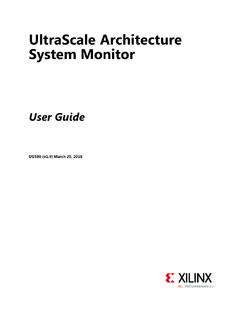Transcription of Property and paying for residential care - Age UK | …
1 Page 1 of 30 Factsheet 38 Property and paying for residential care August 2018 About this factsheet This factsheet explains how your Property is treated in the local authority financial assessment if you go to live permanently in a residential care home. It covers the possibility of retaining your home via a deferred payments arrangement. Other factsheets cover different aspects of the charging system if you are placed by a local authority, for example factsheet 10, paying for permanent residential care . Factsheet 58, paying for short term and temporary care in a care home, covers short-term circumstances such as respite care . The information in this factsheet is correct for the period August 2018 to July 2019, but rules and figures sometimes change during the year. The information in this factsheet is applicable in England. If you are in Scotland, Wales or Northern Ireland, please contact Age Scotland, Age Cymru or Age NI for their version of this factsheet.
2 Contact details can be found at the back of this factsheet. Contact details for any organisation mentioned in this factsheet can be found in the Useful Organisations section. Age UK factsheet 38 August 2018 Property and paying for residential care Page 2 of 30 Contents 1 Recent developments 4 2 Terminology and sources used in this factsheet 4 3 Property and the local authority means test 5 Ownership of Property 6 4 Disregarded Property 7 Mandatory disregards 7 Circumstances where it may be unclear 8 Discretion to disregard 8 The 12-week Property disregard 9 Moving from a disregarded Property 10 5 Valuation of jointly owned Property 10 6 Pension Credit and Property 12 7 Giving away your assets and deprivation 13 8 Business assets disregard 13 9 paying for yourself 13 10 Park/mobile homes 14 11 Deferred payment agreements 14 The basic eligibility criteria 15 Local authority discretion to agree 16 Estimating care costs and top-ups 16 How much can be deferred?
3 16 Sustainability of the arrangement 17 Obtaining adequate security 18 Property valuation 19 Financial contributions from other sources 19 Disposable Income Allowance 20 Interest and administration charges 20 Your written agreement and its contents 21 Age UK factsheet 38 August 2018 Property and paying for residential care Page 3 of 30 Responsibilities while the agreement is in place 23 Local authority powers to stop the arrangement 23 Termination of agreement 24 A loan style deferred payments agreement 25 12 Information and advice 25 13 Challenging local authority decisions 27 Useful organisations 28 Age UK 29 Support our work 29 Age UK factsheet 38 August 2018 Property and paying for residential care Page 4 of 30 1 Recent developments Local Authority Circular (DH)( 2018 )1, published in January 2018 , kept all rates and financial thresholds for charging for care and support at the same levels as the previous financial year.
4 Deferred payments regulations were amended with effect from 5 February 2018 to allow self-funders to have a right to deferred payments. 2 Terminology and sources used in this factsheet care homes and nursing homes This factsheet provides information about residential care , meaning care homes and nursing homes . These are the two standard terms used by the care Quality Commission, the industry standards regulator. Nursing homes are care homes where a nurse must be present to provide or supervise medical-type care alongside basic personal care . The NHS directly funds this for each nursing home resident. The term care home is used in the text to cover both homes, unless nursing home is specifically required. Financial assessment and means test describe how a local authority takes your assets into account when deciding how, or whether, to fund services it is arranging to meet your needs. Charging regulations and statutory guidance There are references to charging regulations and statutory guidance that support the care Act 2014 ( the Act ) throughout this text.
5 These set out in detail how a local authority must administer adult social care . The most relevant are: care and Support (Charging and Assessment of Resources) Regulations 2014 ('the charging regulations') care and Support (Deferred Payments) Regulations 2014 ( the deferred payments regulations ) The other reference source is the care and Support Statutory Guidance 2014 ('the guidance'). Section 8 covers Charging and financial assessment , section 9 Deferred payments agreements , annex B covers treatment of capital, and annex C covers treatment of income. Local authority In this factsheet, references to a 'local authority' refers to the adult social services or social care department of the local authority or council. It is used to describe similar departments within: a county council, a district council for an area in which there is no county council, a London borough council, or the Common Council of the City of London. Age UK factsheet 38 August 2018 Property and paying for residential care Page 5 of 30 3 Property and the local authority means test Local authority arranged residential care If you ask for local authority support to arrange residential care , they carry out an assessment of your needs.
6 They decide if you meet the eligibility criteria and if residential care is the best way to meet your needs. They must consider all other options that might allow you to remain at home. The care home recommendation must be in a care and support plan agreed with you. A financial assessment ( means test ) is made to see if you must pay something towards the care home fees. In some cases, you must pay the full amount. Your income and capital is included in the assessment, although some is disregarded. Capital includes savings, investments and Property . Income includes pensions and welfare benefits The local authority has a legal duty to ensure your needs are met, if these are found to be eligible needs and, following the financial assessment, you are entitled to local authority funding, The local authority must also ensure your eligible needs are met if you do not qualify for funding but cannot arrange care for yourself, and have no one who is willing and able to do it for you, As part of this process, a local authority must give you a personal budget figure sufficient to ensure your eligible needs can be met and that provides you with a choice of care homes.
7 Note In 2018 /2019, if you have capital over 23,250, you must meet the full cost of your care home fees. This is called being a self-funder. For information about getting a needs assessment, see factsheet 41, How to get care and support. Valuation of capital in the form of Property If a Property is taken into account in your means test, it is at its present market value, less any mortgage or loan secured on it and less 10 per cent where there would be expenses involved in selling it. The 10 per cent rule is only for calculating the value of a Property before its sale. Once your Property is sold, you are treated as having the actual share of the sale proceeds you are entitled to after any secured debts and the actual expenses of sale have been paid. Age UK factsheet 38 August 2018 Property and paying for residential care Page 6 of 30 No need for a precise valuation If you and the financial assessor agree that, after deducting any relevant amounts, the total value of your Property is significantly more than the upper capital limit of 23,250, it is not necessary to obtain a precise valuation.
8 However, the local authority should bear in mind how close you are to the upper capital limit when deciding whether to obtain a precise valuation and tell you about options such as deferred payments. Disputes over valuation If there is a dispute over the value of your Property , the guidance requires an independent valuation to be arranged by your local authority within the 12-week Property disregard period (see section ). This should be undertaken by a professional valuer who must provide a current market valuation. Annex B of the guidance states the aim should be to resolve this as quickly as possible to enable local authorities to work out what charges a person should pay and enable the person, or their representative, to consider whether to seek a deferred payment agreement. Ownership of Property There is legal and beneficial ownership of Property , with most people having both. You have a beneficial interest if you are entitled to a share of the proceeds of its sale.
9 This is what can be taken into account in your local authority financial assessment. If you contribute towards the purchase price of a Property , or otherwise contribute towards it later on, you may be able to establish a beneficial interest in the Property , even if it is legally owned by someone else. If a Property was purchased under the right to buy scheme at a discount, the person who attracted the discount may be treated as having a beneficial interest equal to the discount obtained, even if he or she did not contribute towards the purchase. If the beneficial interests in a Property are disputed, it may be necessary to consult a solicitor. If more than one person has a beneficial interest, a Property is valued as if it is jointly owned (see section 5). Ownership disputed The guidance states that if ownership is disputed, a local authority should seek written evidence to prove where the ownership lies. If a person states they are holding capital for someone else, the local authority should obtain evidence of the arrangement, the origin of the capital and intentions for its future use and return to its rightful owner.
10 Age UK factsheet 38 August 2018 Property and paying for residential care Page 7 of 30 4 Disregarded Property Mandatory disregards If you enter a care home permanently, any interest you have in your existing main or only home is usually taken into account as capital. However, the value is disregarded from the means test if any of the following people occupy the home. It applies if you no longer occupy the home but it is occupied, in part or whole, as their main or only home by: your spouse, partner, former partner or civil partner, except where you are estranged a lone parent who is your estranged or divorced partner a relative of yours, or member of your family, who is: aged 60 or over, or a child of yours aged under 18, or incapacitated. They must have been occupying the Property before you went into the care home. The disregard lasts until this changes, at which time it may become an eligible capital asset.

















